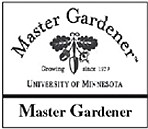September 12, 2003 at 9:45 a.m.
As I write this article we are going through the longest period of the summer without rain. Contrast that with a Sunday morning in May where I had ducks swimming in my garden, followed by a six-inch rain in June. These rains produced multiple hatches of mosquitoes but also put some moisture reserve in the subsoil for this dry period.
Last week, we went to a reunion in Kellogg, MN which is south of Wabasha. They haven't had any rain for six weeks, the crops are scorched, and many trees are really stressed.
Success of spring and summer crops depended on where and when they were planted. For example, the ducks swimming down my rows of onions and early sweet corn, definitely affected my crop this fall. Some of my onions died and some are smaller because of the wet spring.
This is the strangest year ever for my sweet corn. Again, my early planting was affected because the ground was so wet that the roots of the corn were very shallow. We went to Texas for a week to attend a grandson's graduation. When we returned, the weeds were as tall as the corn. Since they had such shallow roots I didn't dare to pull the weeds because I would disturb the corn. Later, when the corn was in the tassel stage, for some reason, it didn't pollinate, thus no ears.
My second crop of sweet corn was doing great until the deer discovered the silk on the forming ears. After eating apples, and grazing on soybeans they ate the young cobs for dessert. They hardly left enough corn for the raccoon to eat. I felt a little better when I had to buy sweet corn at a local roadside stand. One seller told me that they no longer raise their own sweet corn due to the deer, raccoon and opossum. I guess I felt better knowing that misery loves company.
Not long ago I received a call from Bob Porter. Bob writes for the Chisago County Historical Society. He had noticed in his travels that the apple trees were loaded with fruit. He also sees many of the trees so loaded with apples that branches are breaking. I told Bob that we were having the same problem in our orchard. Many branches are cracked or broken off. We have braced some of them, but in many cases, it was too late. We also have been picking off the small and blemished apples in hopes of preventing further damage to the trees. Another year we must do a better job of thinning out small apples early in the season.
Earlier this summer I received a call from a gardener concerned that there were not any pumpkins developing in her patch. She said that the vines were very healthy and there were blossoms, but no small pumpkins. That was the first call on that problem this year. Last year I received many calls concerning squash, pumpkins and even cucumbers not producing. This gardener said that she had planted her pumpkins in a different area and that she hadn't noticed any bees in the garden. I suggested she get in touch with a former master gardener who knew about self-pollinating pumpkins. The main problem with the pollen of vine crops such as squash and pumpkins is that the pollen is so heavy that it takes insects to carry it from plant to plant.
Someone called me and asked if they could transplant rhubarb in the fall. I suggested she wait until spring. However, the July/August edition of the Northern Gardener claims that fall is an excellent time to transplant both peonies and rhubarb. They both do best in a sunny location and transplant as soon a possible. By now, their leaves will have gathered enough energy to store in the roots for next year's growth.
On rhubarb, try to dig out a large enough root ball and move it with soil hanging onto the roots. If the plants are really big, divide them into halves or quarters with a sharp spade or knife before replanting.
+++++
To learn more about this topic or others, go to the U of M Extension Service web page at www.extension.umn.edu and search. Or, you may call our Yard and Garden Line anytime and leave a message at (612) 624-4771. A Master Gardener will return your call. The Master Gardeners also staff the Extension Office on Monday from 4:30 to 8 p.m. Call (651) 674-4417 or drop by with your samples and gardening questions.
Applications for the 2004 Master Gardener Training program are now available from your county extension office. The deadline for Chisago County is September 19, 2003.




Comments:
Commenting has been disabled for this item.